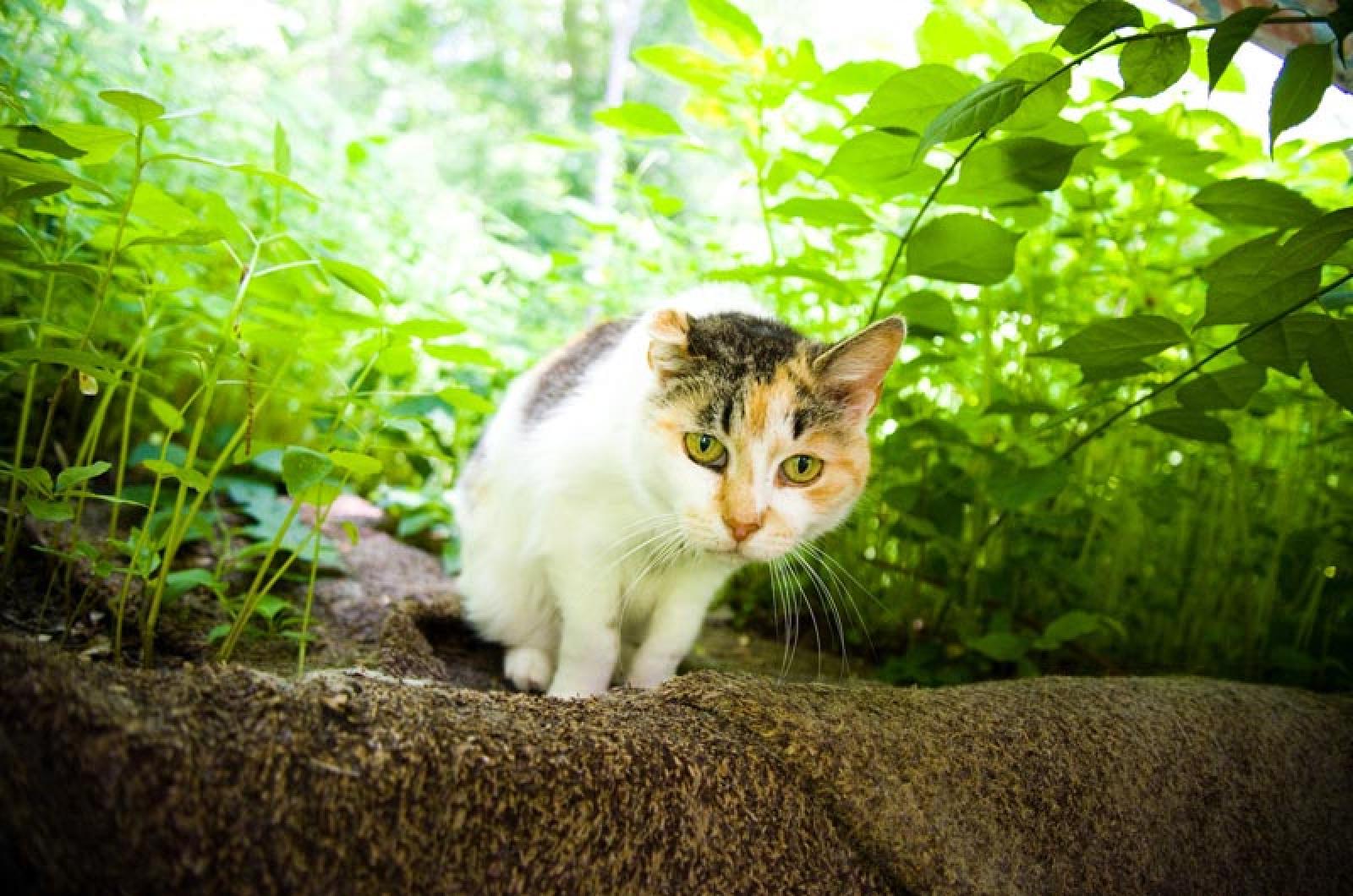A Vineyard organization devoted to spaying and neutering feral cats will be closing its feral cat shelter at the end of the year.
Laurie Huff, the founder of Cattrap Inc., said the organization will lose its lease on a barn sheltering rescued feral cats in December. Cattrap is scrambling to find homes for some of the 15 to 20 cats, now semi-feral, who call the barn home, including Holiday, a friendly calico who was found with a distended colon; Frasier, a big black cat who lived under a porch, and Misty from Katama.
The barn off Indian Hill Road in West Tisbury once housed up to 57 feral cats. Today the remaining cats have free rein of the buildings, which are fitted with cat doors and offer dozens of cat beds. On Wednesday morning this week, butterflies and birds flitted around the fields while a large orange and white cat sunned himself on the rock. The cats are fed daily. Some are friendly, though wary of strangers, while others keep their distance.
Ms. Huff founded Cattrap Inc., a non-profit 501(c)(3) organization, in 1994. Beyond housing some semi-feral cats, Cattrap is dedicated to trapping, spaying and neutering feral cats on the Island. Ms. Huff said 6,500 feral cats have been spayed and neutered in the last 19 years.
Spaying and neutering feral cats helps to reduce the population and prevents the spread of disease among the cats, she said.
In 2004, Ms. Huff moved to California (taking several feral cats with her) and Lee Dubin stepped up to lead the organization. When Ms. Huff sold her home, she made a deal that the cat barn on her property could continue to operate for seven years. That lease expires in December.
After Cattrap spays or neuters feral cats that it traps around the Island — a colony of more than 40 cats was recently trapped and fixed in Aquinnah — some of the cats go back to where they were, as long as they had guaranteed food. Ms. Dubin said many feral colonies have people that feed them.
But cats that do not have guaranteed food or have health problems stay at the Cattrap shelter. Kittens that are trapped are often adoptable.
The organization is looking for volunteers to take in about 11 cats, Ms. Huff told the Gazette. The semi-feral cats do not want much human attention, she said, but are looking for food and a place to sleep. A barn or an outbuilding is an ideal place for them to stay, and the cats would also offer mouse removal services.
Ms. Huff said the semi-feral cats would not survive on their own in the wild. Those who could offer the kind of shelter needed can call Ms. Dubin at 774-994-7280 or 508-696-3869.
Cattrap will continue as an organization without a physical presence after December, Ms. Dubin said. She will continue to check on cats, arrange spaying and neutering, and loan the organization’s humane traps to people with feral cats on their property. The organization does fundraising through events like a gourmet Italian lunch that raised $3,000, bake sales that bring in around $800 and donations from Islanders sympathetic to the cause. Right now, Ms. Dubin said, Cattrap is “kind of on empty.”
A branch of the organization is also operating in Nantucket.
Ms. Huff said she started Cattrap after seeing sick feral cats on the Island. “We just started trapping and trapping,” she said. Her organization went to the Edgartown dump, other landfills and people’s yards, trapping 287 kittens in the first season. “It was horrifying. I had no idea,” she said. The organization also arranged for medical and dental care for the cats.
She urged Islanders to continue Cattrap’s work, noting that while many people feed or offer shelter to feral cats, few take the cats to be spayed or neutered.
While Ms. Dubin will no longer make daily trips to the Cattrap barn, her work will continue. This week, she was tending three feisty feral kittens at her West Tisbury home and running to Aquinnah to return a recently neutered male cat.
The work is “full time with no pay, but it’s the most rewarding work because nobody else wants to do it,” Ms. Dubin said at the shelter this week. “I love it.”
“This will not stop just because the barn door is closing on Cattrap,” she added. “Work has to continue.”







Comments (11)
Comments
Comment policy »